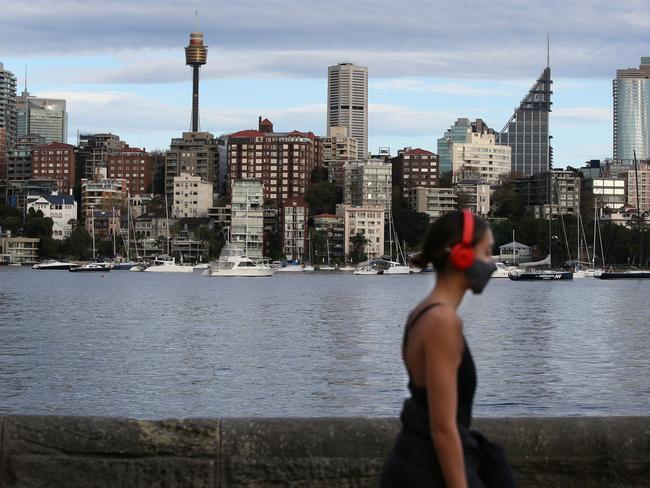Scientists say windy weather can spread Covid-19
New research has revealed why face masks should be worn outdoors to protect against Covid-19, “particularly in breezy conditions”.

Illness
Don't miss out on the headlines from Illness. Followed categories will be added to My News.
Windy weather may accelerate the spread of Covid-19 virus particles, according to new research which recommends the wearing of face masks outdoors “particularly in breezy conditions”.
The study by researchers from the Indian Institute of Technology Bombay, published in the journal Physics of Fluids this week, found that when a person coughs outdoors, wind blowing in the same direction can propagate the virus faster over longer distances than in calm conditions.
“The study is significant in that it points to the increased infection risk that coughing in the same direction as the wind could bring about,” study co-author Amit Agrawal said in a media release.
“Based on the results, we recommend wearing masks outdoors, particularly in breezy conditions.”
Most studies model cough flow using puffs of air or a simple pulsating profile, but a real cough is more complicated and difficult to model, “exhibiting turbulent flow with prominent vortical structures swirling like mini-whirlpools”, according to the researchers.
For their study, they investigated these vortices using a large eddy simulation, which is a numerical model in computational fluid dynamics that simulates turbulence.
They found that the vortices enable bigger droplets to stay in the air longer than had been previously assumed.
“The increase in residential time of some of the larger droplets will increase the viral load transmitting through the cough jet and, therefore, the chances of infection,” Professor Agrawal said.
“Overall, the study highlights increased chances of infection in the presence of even a light breeze.”
Even a “light breeze” of about 8km/h “extends effective social distancing by around 20 per cent”, from 0.9m-1.8m to 1.1m-2.2m, the simulation found.

Why wear face masks outdoors?
The issue of wearing face masks outdoors has been one of the most divisive topics throughout the pandemic.
The World Health Organisation recommends that people wear masks outside if they “cannot maintain physical distance from others”, such as in “busy markets, crowded streets and bus stops”.
But experts have said there is little evidence face masks prevent outdoor transmission.
A large Danish study published in the Annals of Internal Medicine this year found virtually no difference in infection rates between people who wore masks outside the home and a control group.
Similarly, a 2020 meta-analysis of 10 randomised studies into the effectiveness of face masks and other measures to combat the spread of the flu “found no significant reduction in transmission”.
“Disposable medical masks (also known as surgical masks) are loose-fitting devices that were designed to be worn by medical personnel to protect accidental contamination of patient wounds, and to protect the wearer against splashes or sprays of bodily fluids,” the authors wrote.
“There is limited evidence for their effectiveness in preventing influenza virus transmission either when worn by the infected person for source control or when worn by uninfected persons to reduce exposure. Our systematic review found no significant effect of face masks on transmission of laboratory-confirmed influenza.”
In July, NSW Health admitted that there had not been a single confirmed case of outdoor transmission in the state during the entire pandemic.
But the next month, former premier Gladys Berejiklian made face masks mandatory outdoors for the first time, acknowledging it “makes it easier for police” to identify rule-breakers.
“Our concern is that when people are walking past a group of people or accidentally bumping into people, that can cause that fleeting contact and transmission,” she said.
“It also makes it easier for police to make sure everybody is sticking to the rule. Unless you are exercising, masks outdoors applies to every single citizen across NSW, whether you live in Sydney or the bush, everybody has to respect that.”
News.com.au asked NSW Health to confirm whether there had been any known cases of outdoor transmission since July, and for any studies or research that had informed decision to impose an outdoor mask mandate.
“The risk of Covid-19 transmission is far less in outdoor settings than in indoor settings, if people maintain physical distance,” a spokeswoman said in a statement.
“While confirmed cases of outdoor transmission are relatively uncommon, in many cases it can be difficult to pinpoint the exact point of transmission, especially if people have been in each other’s company for long periods of time.”
The mandatory mask rule was scrapped on Monday as NSW emerged from more than 100 days of lockdown.
Masks are still mandatory outside the home in Victoria for everyone over the age of 12.
Premier Daniel Andrews was fined a total of $400 last week after being caught out twice failing to wear a mask outdoors.
Originally published as Scientists say windy weather can spread Covid-19





